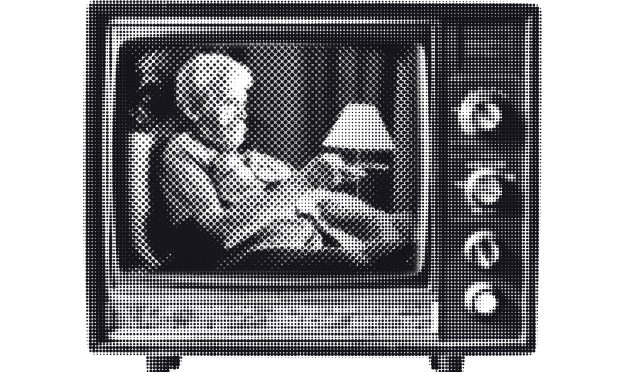
Almost a quarter of older people rely on television and radio as their main form of company, new research by Age Scotland has revealed.
The charity described the figures as heartbreaking and called for a new national focus on tackling loneliness.
The call comes as new data from Scotland’s Census shows that with 37% of our households now single occupancy, there are more older people living on their own here than anywhere else in the UK.
In the 1960s, just 14% of Scots lived on their own.
Age Scotland’s chief executive, Katherine Crawford, said: “Loneliness is a public health crisis which we all have a role to play in tackling. It is heartbreaking that such a huge number of older people feel that their main form of company is their TV or radio.
“We’d like to see much more national focus on tackling the scourge of loneliness.
“That’s why we’re calling on the Scottish Government to make this a national priority and do everything they can to improve the lives of people in Scotland affected by the devastating impact of loneliness.”
Tackling loneliness
The charity, our partners in The Sunday Post’s Big Braw Community campaign to end loneliness, which is known to increase the risk of dementia by up to 50% as well as increasing the risk of heart and stroke problems, are calling on the government to do more to prevent this public health crisis.
Crawford said: “The Big Braw Community campaign represents a unique route to put tackling loneliness and isolation firmly back on the political and social radar.
“It’s a fantastic campaign and we’d encourage as many organisations and groups as possible to firmly grasp the opportunity to get involved. Not only is it providing a platform to showcase the vital work going on to ensure people stay connected in communities across Scotland, but it is also sparking interesting debate as we look at the investment and policy work still required if we are to successfully halve loneliness levels by 2030.
“We also hope the campaign is inspiring individuals to consider what simple actions they can take to tackle loneliness on a day-to-day basis.
“From checking in with older relatives, friends and neighbours, to taking part in inter-generational activities, a small gesture or offer of support can be all it takes to turn someone’s day around if they feel on their own.”
Age Scotland has told the Scottish Government to ensure people, especially those aged 55 and over, are encouraged to “live well” or face a massive surge in the need for social care.
Crawford said: “We must ensure older people are able to stay connected to communities, services and people as this is vital in tackling the acute issues of loneliness and social isolation.”
Age Scotland runs a hugely successful Friendship Line which allows those living on their own to stay in touch with others with weekly telephone calls.
‘TV is always company’
Nan Prentice, 76, from Alloa, looks forward to her weekly catch-up call, and says it “makes her day” to speak to someone.
She said: “I used to be a carer and had a busy life going in and out of other people’s homes and looking after them. I’m lucky that I get my lunches delivered through a local scheme, and that and my weekly friendship call keep me going as they are often the only human contact I get.
“I rely on the television for company. I enjoy crime dramas and documentaries. It’s always company when you are housebound like I am.”
Scottish Conservative Shadow Social Justice Minister Miles Briggs said: “These stark figures clearly show we are sitting on a health and social care time-bomb if the government fails to act. Loneliness has such a pervasive effect; it should be addressed under the National Performance Framework as a National Outcome for Scotland’s collective wellbeing.”

Dr Vivek Pattan, chairman of the Old Age Faculty, Royal College of Psychiatrists in Scotland, said: “These are worrying statistics indeed. The knock-on effect could be devastating to the NHS and support services and become a hidden public health crisis.
“The fact is loneliness kills and is dangerous to a person’s health.”
Equalities Minister Kuakab Stewart said: “I welcome The Sunday Post’s campaigning on this important issue.
“The Scottish Government recognises that social isolation and loneliness is a vital public health issue.
“That is why we launched our social isolation and loneliness fund, providing £3.8 million over the next three years to organisations that help people to connect with one another in our communities.”
‘Even a few minutes of chat can be positive’
Asda delivery drivers wear “Happy to Chat about the game” badges to help tackle loneliness during the summer of sport.
The supermarket relaunched it’s Happy to Chat initiative, which offers its delivery drivers in Scotland the option to add a “Happy to Chat about the game” badge to their uniform to let customers know they’re happy to have a chat with them whilst their shopping is being delivered.
It was recognised that the drivers formed a lifeline for some people throughout the covid pandemic, with almost a quarter (23%) of customers admitting they were only interacting with people once a week – many of whom were delivery drivers.
John Gregory, delivery driver at Asda Tain, has worked at the store since it opened in 2012 and has proudly been wearing the badge during his shifts.
John said: “When we initially launched the Happy to Chat badges to combat isolation during the pandemic we had such a positive response, especially from our older customers. I’m really pleased we have a twist on the badges so we can kick off a conversation whether that’s about the game or just to ask them how they are. I know from experience that even just having a few minutes chat with someone whilst you’re delivering their shopping can have a such a positive impact on their day.”
Age Scotland Friendship Line: 0800 12 44 222

Enjoy the convenience of having The Sunday Post delivered as a digital ePaper straight to your smartphone, tablet or computer.
Subscribe for only £5.49 a month and enjoy all the benefits of the printed paper as a digital replica.
Subscribe © John Young
© John Young